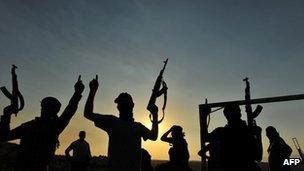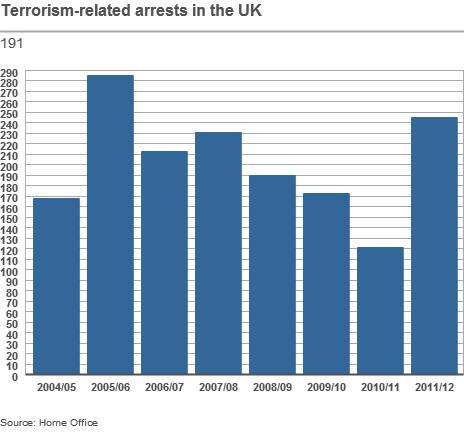500 terror suspects 'deradicalised' by Home Office
- Published

Jihadist in Syria include Europeans, says Home Office
More than 500 individuals have been put through a counter-terrorism deradicalisation programme, the Home Office has revealed.
Some 2,500 people were referred to the programme between January 2007 and December 2012.
In the counter-terrorism annual report, the Home Office said that hundreds of European jihadists had gone to Syria.
It warned that the overall threat to the UK had diversified beyond al-Qaeda plots developed from within Pakistan.
The 500 individuals who were given support through the Home Office's "Channel" programme included people who held extreme far-right views or were inspired by al-Qaeda. Some of the individuals steered away from violent extremism were of school age.
Charles Farr, head of the Home Office's Office of Security and Counter-Terrorism, said: "I really believe Channel is an essential part of our counter-terrorism. If you look at the cost by comparison, if those people had to be put through the criminal justice system or an investigation, it's a fraction of the amount. This is quite apart from the damage it does to families and communities."
Diversity of threats
The report said that hundreds of Europeans jihadists have gone to Syria to take part in the fighting. There had been 60 suicide attacks since the conflict escalated.
Further afield, the report reveals that the government has been increasingly concerned with Islamist groups turning to kidnap for ransom.
Some 150 foreign nationals have been held since 2009, 13 of them British. The number kidnapped in 2012 was double that in 2010.
Security officials estimate that the extremist groups have collected at least $60m (£39.5m) in ransom payments since 2008, either from governments or companies.
The UK is to lobby other members G8 nations to formulate a co-ordinated security response to kidnappings.
The annual report says that while Pakistan remains of highest importance, the overall threat to the UK has diversified.
'Significant challenges'
Mr Farr said: "We're in a potentially key moment. The threat has dispersed and diversified to the point where it might require more resources because we're having to spread those resources across a wider geographical area.
"This poses significant challenges to our national security and to the security and intelligence agencies and departments working on counter-terrorism.
"Operating in these areas is difficult and dangerous, requires very significant resources and is complicated and at times made impossible by the breakdown of governance and law and order."
In the UK, there were 245 terrorism-related arrests in 2012, slightly higher than the average since 2001. Police say they have foiled a plot as big as the 7 July 2005 attacks every year.
Officials were also concerned about the witting or unwitting misuse of charities in the UK.
Earlier this year, three men were convicted of preparing a major plot in which they had posed as legitimate charity workers. They raised some £13,000 by conning ordinary people into handing over money.
